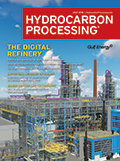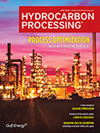
July 2018
Special Focus: Refinery of the future
Hydrocarbon Processing Industry (HPI) companies are using digitalization in concert with improved processes and skills to squeeze more productivity from existing assets.
Recently, the authors developed a first-pass financial estimate of the savings resulting from the implementation of a cybersecurity program for a 100-Mbpd refinery.
Industrial digitalization is changing the standards for operator training in the global process industry.
Process Optimization
The installation and operation of suitable separation and filtration systems have become key components of virtually all process units, especially amine units.
Maintenance/Reliability
The 2005 Buncefield and 2009 CAPECO terminal explosions are two of the most significant storage tank incidents in history.
Bonus Report: LNG Technology
A dramatic acceleration of a trend toward smaller volumes and shorter tenures for LNG contracts in 2017 highlights the growing commoditization of the global LNG market, even as it raises troubling questions about future supply.
As global liquefied natural gas (LNG) trade continues to rapidly expand, the challenge of liquefaction process selection—a key element of an LNG project—becomes increasingly important.
Alkanolamines have been used for acid gas removal from natural gas for several decades.
As the world’s hydrocarbon appetite continues its rapid turn toward lighter fare (e.g., natural gas for power generation, transportation and industry), massive, near-term investments in global, capital-intensive, fully digitalized LNG infrastructure are needed.
According to the International Group of LNG Importers (GIIGNL) publication, “The LNG industry: GIIGNL annual report 2018,” global LNG trade has increased from approximately 264 MMtpy in 2016 to nearly 290 MMtpy in 2017.
IIoT
Over the past few decades, the world has seen a surge in demand for oil and gas, and global markets have responded to meet these growing energy needs.
Historical statistics indicate that 25% of projects have budget overruns and a further 50% have schedule slippage.
Environment and Safety
Corrosion is a major challenge and risk to contain for any oil and gas operator.
A previous article<sup>1</sup> outlined the extended approach of the ALARP (as low as reasonably practicable) approach to the direction of the lifecycle project risk management and decision-making process.
Every process plant has a dedicated disposal system to ensure that gases from equipment, instruments and pressure safety valves are flared to follow environmental norms for the gases vented to the atmosphere from the flare stack.
Trends and Resources
In the June issue of Hydrocarbon Processing, the Industry Perspectives section detailed the increase in new project announcements in the downstream processing sector.
It is never a good sign when a piece of equipment exhibits unsafe behaviors—such as large, unexpected vibrations, or cracks forming around instrument ports—particularly in the thermal reactor of a sulfur plant, where high-temperature gaseous streams chemically react as part of the process that produces elemental sulfur.
In the US, improved domestic gasoline demand and tighter middle distillate and fuel oil markets drove refinery margins to a new all-time high, and Atlantic Basin product markets saw gains across the barrel.
Hydrocarbon Processing’s Construction Boxscore Database is tracking more than 1,600 projects around the world, representing more than $1.8 T in capital expenditures.
Columns
In early June, Hydrocarbon Processing and Eni—an Italian multinational oil and gas company—hosted the annual International Refining and Petrochemical Conference (IRPC) in Milan, Italy.
With certain turbocompressor designs having changed as manufacturers and user-clients constantly push to increase output and efficiency, it pays to know if—and how—high-performance couplings (HPCs) have kept pace.
The impact of digital transformation on the LNG value chain is an area of active discussion and urgency.
Today’s digital innovation is reshaping industries, disrupting business models and operating practices, and transforming business ecosystems.
Unfortunately, nation states appear to be launching cybersecurity attacks on other nation states.
Toyo Engineering (Toyo) was awarded a contract to deliver a large-scale steam cracker complex in Malaysia.
Although overall industry growth is not substantial from 2017 to 2018, it translates to $66 MM more in valve shipments for the year, which is a positive sign for the industry.

- Petrobras wrapping up due diligence to buy back refinery from Mubadala 7/26
- US court rejects EPA denials of 2022 small refinery biofuel waivers 7/26
- Mexico seeks more 2025 fuel import deals after refinery delays 7/26
- PETRONAS, Eni and Euglena reach FID to construct a biorefinery in Malaysia 7/26
- ExxonMobil signs carbon capture agreement with CF Industries in Mississippi (U.S,) 7/26
- WoodMac: LNG truck sales impacting Chinese road diesel demand 7/26
- Digital Exclusive: SPECIAL FOCUS: Digital Technologies—Utilize process simulation digital twin to optimize condensate yield
- Digital Exclusive-Flare system design: Liquid pockets in flare headers
- Hydrogen-rich content gasoline: A new concept for paraffinic gasoline reformulation
- Alarm rationalization at Kuwait National Petroleum Company (KNPC) refineries




